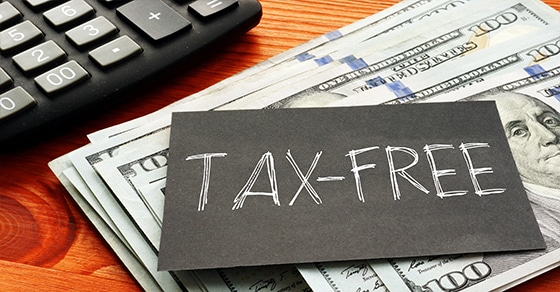Believe it or not, there are ways to collect tax-free income and gains. Here are some of the best opportunities to put money in your pocket without current federal income tax implications:
- Roth IRAs offer tax-free income accumulation and withdrawals. Unlike withdrawals from traditional IRAs, qualified Roth IRA withdrawals are free from federal income tax. A qualified withdrawal is one that’s taken after you’ve reached age 59½ and had at least one Roth IRA open for over five years, or you are disabled or deceased. After your death, your heirs can take federal-income-tax-free qualified Roth IRA withdrawals, with proper planning.
- A large amount of profit from a home sale is tax-free. In one of the best tax-saving deals, an unmarried seller of a principal residence can exclude (pay no federal income tax on) up to $250,000 of gain, and a married joint-filing couple can exclude up to $500,000. That can be a big tax-saver, but you generally must pass certain tests to qualify. For example, you must have owned the property for at least two years during the five-year period ending on the sale date. And you must have used the property as a principal residence for at least two years during the same five-year period. Note: To be eligible for the larger $500,000 joint-filer exclusion, at least one spouse must pass the ownership test and both spouses must pass the use test.
- People with incomes below a certain amount can collect tax-free capital gains and dividends. The minimum federal income tax rate on long-term capital gains and qualified dividends is 0%. Surprisingly, you can have a pretty decent income and still be within the 0% bracket for long-term gains and dividends — based on your taxable income. Single taxpayers can have up to $47,025 in taxable income in 2024 and be in the 0% bracket. For married couples filing jointly, you can have up to $94,050 in taxable income in 2024.
- Gifts and inheritances receive tax-free treatment. If you receive a gift or inheritance, the amount generally isn’t taxable. However, if you’re given or inherit property that later produces income such as interest, dividends, or rent, the income is taxable to you. (There also may be tax implications for an individual who gives a gift.) In addition, if you inherit a capital gain asset like stock or mutual fund shares or real estate, the federal income tax basis of the asset is stepped up to its fair market value as of the date of your benefactor’s demise, or six months after that date if the estate executor so chooses. So, if you sell the inherited asset, you won’t owe any federal capital gains tax except on appreciation that occurs after the applicable date.
- Some small business stock gains are tax-free. A qualified small business corporation (QSBC) is a special category of corporation. Its stock can potentially qualify for federal-income-tax-free treatment when you sell for a gain after holding it for over five years. Ask us for details.
- You can pocket tax-free income from college savings accounts. Section 529 college savings plan accounts allow earnings to accumulate free of any federal income tax. And when the account beneficiary (typically your child or grandchild) reaches college age, tax-free withdrawals can be taken to cover higher education expenses. Alternatively, you can contribute up to $2,000 annually to a Coverdell Education Savings Account (CESA) set up for a beneficiary who hasn’t reached age 18. CESA earnings are allowed to accumulate free from federal income tax. Then, tax-free withdrawals can be taken to pay for the beneficiary’s college tuition, fees, books, supplies, and room and board. The catch: Your right to make CESA contributions is phased out between modified adjusted gross incomes of $95,000 and $110,000, or between $190,000 and $220,000 if you’re a married joint filer.
Advance planning may lead to better results
You may be able to collect federal-income-tax-free income and gains in several different ways, including some that aren’t explained here. For example, proceeds from a life insurance policy paid to you because of an insured person’s death generally aren’t taxable. So, don’t assume you’ll always owe taxes on income. Also, check with us before making significant transactions because advance planning could result in tax-free income or gains that would otherwise be taxable.
© 2024




